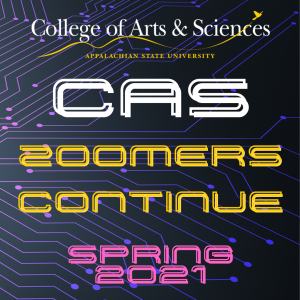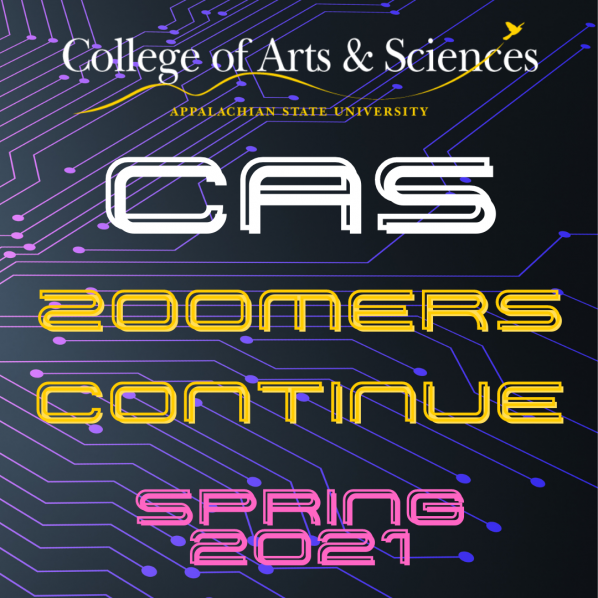In the midst of a global pandemic, the College of Arts and Sciences started a virtual zoom series to engage with Appalachian alumni and friends. We are continuing the series this spring with three sessions. These are free virtual events, open to the public. Registration is required to receive zoom information. See details for each session below and register to join us!
A Mansion on the Parkway: Mrs. Moses H. Cone and the Politics of Public History
Tuesday, February 9, 2021
5-6 p.m.
Zoom Registration - click here to register
In this presentation, Dr. Neva J. Specht and Carrie Streeter will highlight poignant stories from periods in which Moses and Bertha Cone lived at Flat Top Manor but they will also revisit the history of the estate during its management by the National Park Service (NPS). They will discuss the “production of history” at Moses H. Cone Memorial Park—illuminating how the Cone story has been told and the estate interpreted over the years. Using this lens helps reveal larger questions about American history—questions about identity, class, religion, gender, race and more.
Dr. Neva J. Specht completed her Ph.D. at the University of Delaware in American History and Material Culture Studies. She has focused her scholarship on issues related to U.S. History (colonial-early republic); American religion; migration; the Blue Ridge Parkway; museum studies and material culture studies. Specht has received numerous awards for her teaching, but outside of the classroom she enjoys traveling, going to the movies, gardening and coaching soccer. Specht is the past Chair for the North Carolina Humanities Council and current Dean of the College of Arts and Sciences at Appalachian State University.
Carrie Streeter is a lecturer in the History Department of Appalachian State University and a doctoral candidate at the University of California, San Diego, specializing in U.S. history of health, gender and race. She began her Cone research as a graduate student in Appalachian State University’s Public History program. From 2010 through 2012, she collaborated with Neva J. Specht in writing a historic furnishing plan for Flat Top Manor. In more recent years, she has completed additional research in support of the National Park Service’s interpretive plans at Moses H. Cone Memorial Park. In 2019, Streeter was also a curator of “Modern Visions, Modern Art: The Cone Sisters in North Carolina,” an exhibition at the Blowing Rock Art & History Museum that brought together stories of the Cone family’s history and art from the famous Cone Sisters’ collection, including original paintings by Henri Matisse.
About the Department of History
The Department of History offers a broad curriculum in local, national, regional and world history at both the undergraduate and graduate levels, which encourages history majors to develop a comprehensive approach to human problems. The study of history is an essential part of a liberal arts education and offers valuable preparation for many careers, such as law, journalism, public history, public service and business, as well as in teaching and the advanced discipline of history. Learn more at https://history.appstate.edu.
Contested Cuisines: Southern and Appalachian Foodways
Wednesday, March 10, 2021
5-6 p.m.
Zoom Registration - Click here to register
In this presentation, Dr. Jessica Martell and Dr. Zackary Vernon will examine the dynamic foodways of Appalachia and the U.S. South. While some of the nation’s most unique culinary traditions have emerged from these regions, they are not without controversy. In particular, the so-called “New Southern Cuisine” is often taken to task because its top culinary accolades have largely been bestowed upon white male chefs. To challenge this narrative, Martell and Vernon will explore the various cultural contributions to southern and Appalachian food and drink—from Native American and African American, to Scotch-Irish, German, and Jewish—and highlight the diversity that makes the region a vibrant culinary melting pot. Closer to home, they will also discuss the contributions of Boone chefs, farmers, and activists who are building a more inclusive and equitable High Country food system.
Dr. Jessica Martell is an assistant professor in the Department of Interdisciplinary Studies and an affiliate faculty member of the Center for Appalachian Studies. Martell is an interdisciplinary scholar who specializes in literature, food, film and the environment. Multiple research fellowships in the British archives supported her book “Farm to Form: Modernist Literature and Ecologies of Food in the British Empire” (University of Nevada Press, 2020), which investigates the relationship between the industrial food of empire and the emergence of literary modernisms in Britain and Ireland. She is also the co-editor of “Modernism and Food Studies: Politics, Aesthetics and the Avant-Garde” (University of Florida Press, 2019) and the author of ten peer-reviewed articles and book chapters. Martell serves as the Board Chair of Blue Ridge Women in Agriculture, a woman-led non-profit dedicated to building an equitable and sustainable local food system in North Carolina’s High Country.
Dr. Zackary Vernon is an associate professor in the Department of English at Appalachian and an affiliate faculty member of the Center for Appalachian Studies. Vernon specializes in American literature and film. In particular, his work examines the intersections among environmental activism, philosophy, film and literature from romanticism to the present. Vernon also has an abiding interest in studying the literary, cultural and material history of Appalachia and the U.S. South. His research has appeared in a range of scholarly books and journals, including Journal of American Studies, Southern Cultures and ISLE: Interdisciplinary Studies in Literature and Environment. Vernon is a co-editor of “Summoning the Dead: Essays on Ron Rash” (University of South Carolina Press, 2018), and he is the editor of “Ecocriticism and the Future of Southern Studies” (Louisiana State University Press, 2019).
About the Department of English
The Department of English at Appalachian State University is committed to outstanding work in the classroom, the support and mentorship of students, and a dynamic engagement with culture, history, language, theory and literature. The department offers master’s degrees in English and rhetoric and composition, as well as undergraduate degrees in literary studies, film studies, creative writing, professional writing and English education. Learn more at https://english.appstate.edu.
About the Department of Interdisciplinary Studies
The Department of Interdisciplinary Studies offers degrees in three program areas: global studies; gender, women’s and sexuality studies; and interdisciplinary studies. The department is also home to Watauga Residential College, an interdisciplinary, alternative general education program. The department promotes creative and imaginative engagement through a cross-disciplinary investigation of complex systems and problems. Learn more at https://interdisciplinary.appstate.edu.
Environmental Conservation and Sustainable Partnerships at Appalachian
Tuesday, April 20, 2021
5-6 p.m.
Zoom Registration - click here to register
Dr. Matt Estep is an associate professor of evolutionary genetics in the Department of Biology. The Amphibolite Mountains, located in northwestern North Carolina (Watauga and Ashe counties), are home to many unique plant species. Due to the distinct geology of the area and deep position within the Southern Appalachians, these unglaciated peaks acted as refugia during previous ice ages and today harbor many rare and disjunct species. Small, isolated populations of plants, high on the Amphibolite peaks, are vulnerable to extinction due to a variety of factors (for example, climate change, land development and outdoor recreation). Estep’s lab group focuses on documenting this biodiversity and providing local land managers with valuable demographic or genetic data to help develop management plans that ensure the preservation of our state's natural heritage.
Dr. Christine Hendren is a professor of nanomaterial risk assessment and integration and implementation sciences (I2S) in the Department of Geological and Environmental Sciences. She is also the new Director of RIEEE, Appalachian’s Research Institute for Environment, Energy and Economics. Her work focuses on developing and applying methods, models and human processes to integrate and co-create knowledge across boundaries – disciplinary, sectoral, cultural, geographic – to lead research teams in addressing complex global challenges. She came to this work through problem-based convergent research in the field of nanomaterial environment, health and safety research, which coalesced a broad range of expertise and methods to elucidate what governs nanomaterial behavior and impacts, and translate this understanding into directional guidance for managing potential risks.
Dr. Mark Spond is the National Park Service Liaison for the university and his home academic department is Geography and Planning. The primary function of the liaison position is to manage competitively-awarded task agreements between Appalachian and the National Park Service. Spond has worked extensively in the Southeast with the NPS Youth Programs Division and NPS Cooperative Ecosystems Studies Units Program. These partnerships permit App State to enter task agreements that allow students and recent graduates to secure paid employment working at National Parks and other NPS units. Agreements with NPS sites that address diverse natural and historical resources (e.g., Blue Ridge Parkway, Great Smoky Mountains, Cowpens National Battlefield) provide outstanding opportunities for both members of the Appalachian community and the locations at which the students and graduates are stationed. In addition to serving as the Liaison to the National Park Service, Spond teaches and conducts research on environmental history.
About the Department of Biology
The Department of Biology is a community of teacher-scholars, with faculty representing the full breadth of biological specializations — from molecular genetics to landscape/ecosystem ecology. The department seeks to produce graduates with sound scientific knowledge, the skills to create new knowledge, and the excitement and appreciation of scientific discovery. Learn more at https://biology.appstate.edu.
About the Department of Geography and Planning
The Department of Geography and Planning promotes the understanding of the spatial dimensions of human behavior within the physical and cultural systems of the earth, and the role of planning in achieving improvement in those systems. The department offers degrees in geography and in community and regional planning. Learn more at https://geo.appstate.edu.
About the Department of Geological and Environmental Sciences
Located in Western North Carolina, Appalachian State University provides the perfect setting to study geological and environmental sciences. The Department of Geological and Environmental Sciences provides students with a solid foundation on which to prepare for graduate school or build successful careers as scientists, consultants and secondary education teachers. The department offers six degree options in geology and two degree options in environmental science. Learn more at https://earth.appstate.edu.
About the Research Institute for Environment, Energy, and Economics
Since 2008, Appalachian State University’s Research Institute for Environment, Energy, and Economics (RIEEE) has fostered interdisciplinary research on the environment, energy and economics, especially the areas in which these subjects intersect. The institute serves as an umbrella organization for three centers: the Appalachian Energy Center, Center for Economic Research and Policy Analysis (CERPA) and the Southern Appalachian Environmental Research and Education Center (SAEREC). The work supported by RIEEE is integrated into Appalachian’s academic programs, used to facilitate discovery among K-12 student students and teachers, and employed in the region’s economic development. Learn more at https://rieee.appstate.edu.
About the Appalachian State University Liaison to the National Park Service
The Appalachian State University Liaison to the National Park Service (NPS) is the central contact for initiatives that partner Appalachian with NPS units across the United States. The liaison promotes opportunities, such as service projects and task agreements, that mutually benefit NPS units and university students, faulty, staff and alumni. Past projects have partnered members of the Appalachian Community with NPS natural/cultural resource personnel, interpreters and educational initiatives. Learn more at https://npsliaison.appstate.edu.
By Ellen Gwin Burnette
Jan. 28, 2021
BOONE, N.C.

